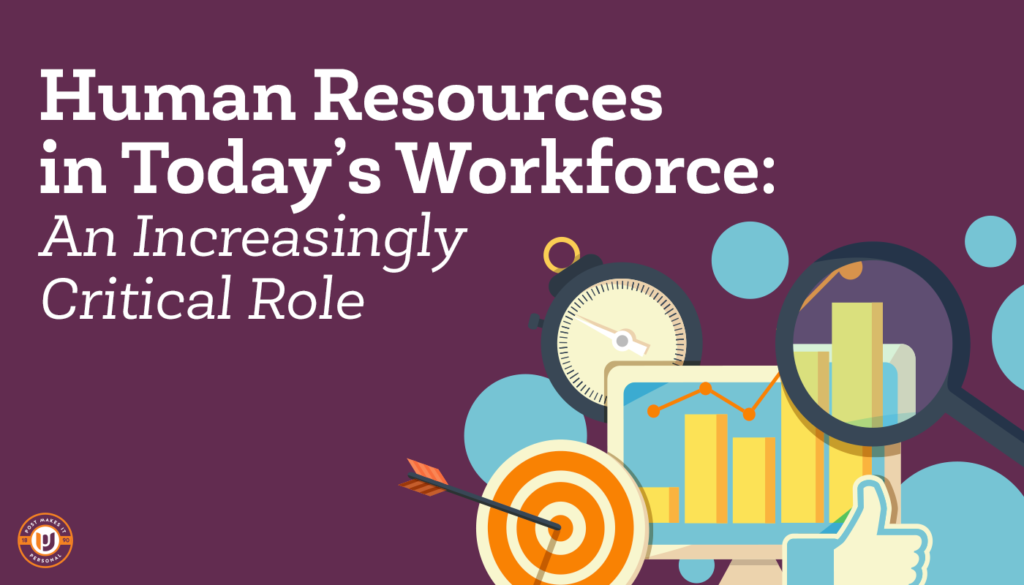What Is Human Resources?
Most employees have a basic and instinctual understanding of what HR involves, but this field is far more vast — and instrumental — than many realize. At its most basic level, however, human resource management provides precisely what its name implies: oversight and guidance centered around the people who keep today’s organizations running. Often, this mission focuses on specific aspects of the employee life cycle: finding the right employees through hiring, preparing them for success with proper onboarding or training, and handling the payroll and benefits that make up each individual’s livelihood.
Underscoring all this, of course, are the best interests of the organization in question. It is up to HR professionals and departments to strike a workable balance between the demands of company leaders and the day-to-day needs of current and future employees.
Recruitment, Hiring, and Onboarding New Employees
HR departments are responsible for finding, vetting, and onboarding the best possible employees. A lot goes into this, as there is more to finding a new employee than examining technical skills or credentials alone. It is just as important that employees fit with the overarching company culture and possess soft skills such as empathy and collaboration.
Many HR specialists focus entirely on recruitment and hiring. In this role, they may be referred to as talent acquisition specialists or recruiters. They may visit college campuses, attend job fairs, or develop online recruitment strategies to attract more attention from would-be applicants. HR is also integral to streamlined onboarding, which includes orientation to help new hires feel as welcome and confident as possible. Additionally, HR specialists oversee the completion of necessary paperwork and the communication of critical policies so that new hires are prepared for their first day on the job.
Improving Retention and Decreasing Turnover
The hiring process can feel relentless, especially as today’s employees spend less time in each position and with each organization. As such, it behooves today’s companies to develop policies that encourage the most talented employees to stick around.
This begins with recruitment and hiring. For example, carefully written job descriptions should accurately convey what each position entails, so there are no undesirable surprises that prompt employees to jump ship.
As we have mentioned, it is also essential that candidates are selected not only based on skill set but also according to their ability to mesh with the company culture. If they share similar values or philosophies, they will be more passionate about their work and less inclined to seek alternate opportunities.
Once employees are hired, HR departments can limit turnover by maintaining open lines of communication and providing opportunities for advancement. This could take the form of mentorship programs or skills training. Additionally, HR specialists can help employees feel appreciated by developing rewards or recognition programs. HR departments should keep track of retention-related metrics while gathering relevant insights from exit interviews.
Handling Employee Benefits and Salaries
Efficient and accurate systems ensure that employees receive their agreed-upon pay on time and according to their expectations. This reliability can play a significant role in employee retention, so its importance should not be understated.
Aspiring HR professionals should recognize that payroll and benefits administration are not the primary functions of most HR teams these days. Instead, this essential tends to fall under the purview of the finance team, with HR ensuring the employee-facing aspects of payroll run as smoothly as possible. There are exceptions, of course, with smaller organizations more inclined to bring HR into the administrative aspects of payroll.
There is far more to payroll and benefits administration than the average employee understands. The data gathered and analyzed via the payroll process provides powerful insights into other aspects of HR. Through payroll data, HR professionals can determine who works when, for how long, and how compensation aligns with employee expectations and industry trends.
Risk and Liability Management
Today’s corporate environments are rife with risks. Many of these relate directly to the very employees who make these organizations run. Other risks center around crucial HR processes, such as recruitment, hiring, or benefits management.
HR professionals specializing in risk and liability management address these risks head-on, gathering extensive data to determine where they exist and how they can be mitigated. Examples of common risks include:
- Workplace conflict
- Workplace injuries
- Employee burnout
- Data privacy concerns
- Compliance with labor laws
- Theft or embezzlement
- Turnover during mergers and acquisitions
An effective approach to risk management can minimize the potential for these and other risks, and when risks are deemed unavoidable, HR can at least limit the damage.

Why Is HR More Important Than Ever?
Amid ongoing labor shortages, organizations must go the extra mile to find and retain the best employees. From the corporate perspective, the value of a well-run HR department is clear: it can provide a competitive edge in an evolving workforce rife with labor shortages. Considerations to keep in mind include:
HR Is the First Step in Achieving Business Goals
Experts at McKinsey anticipate that HR professionals will shape the organizations of tomorrow. The hierarchical structure of yesteryear is already giving way to a more flexible approach which, while exciting, calls for more strategic solutions to everything from recruitment to compensation and even performance management. According to McKinsey, purpose-driven will be a key term, beginning with clear definitions of the organization’s purpose and extending to the selection of purpose-driven employees and purpose-related metrics.
Once organizations have developed their “value agendas,” HR professionals can contribute by “managing talent rigorously” and “building an analytics capability to mine data to hire, develop, and retain the best employees.” These initiatives will improve agility and innovation — qualities that will be imperative to success in the years and decades to come.
Diversity, Equity, and Inclusion
Today’s employers show an increased interest in establishing a trio of qualities known as diversity, equity, and inclusion (DEI). At the corporate level, DEI initiatives produce a myriad of benefits, such as improved sales, greater innovation, and strong employee morale. These initiatives expand opportunities for applicants and employees from all walks of life while ensuring that everyone is treated with kindness and respect.
HR specialists play a vital role in developing and overseeing the initiatives that instill a culture of DEI. These programs and processes must now extend beyond brick-and-mortar workplaces to include virtual solutions. For example, as commentary within the SHRM State of the Workplace Report for 2021 and 2022 indicates, it is now up to HR professionals to determine “who is ‘out of mind’ when they are ‘out of sight'” and what can be done to combat these disparities.
Human Resources Is a Growing Industry
The HR market is already booming, but the rapid rise of this industry is just beginning. This was evident in the aforementioned SHRM State of the Workplace Report. According to this resource, HR budgets are quickly growing, with experts at SHRM explaining, “the vast majority of organizations are planning to increase headcount and develop their people managers to support their organization’s talent needs and to improve their soft skills.”
In this SHRM survey, nearly three-quarters of respondents agreed that their department was “recognized by senior leaders as crucial” to the core functions of their businesses.
Management is also clearly aware of HR’s value, so experts anticipate that this field will see significant growth in the next few years. This increasing priority is reflected in data from the Bureau of Labor Statistics (BLS), which highlights a job outlook of 8 percent for HR specialists between 2021 and 2031.
Make a Difference in the Rapidly Evolving Field of Human Resources
As an HR specialist or manager, you could make the modern workplace as collaborative and innovative as possible. First, however, you will need a targeted education that helps you develop a wide range of important skills. The right degree program will prepare you for a successful career in HR.
At Post University, we are pleased to provide the opportunity to earn your Bachelor of Science in Human Resource Management. We also have an online Human Resource Management Certificate. Both programs help you develop fundamental skills for pursuing a variety of HR and related career paths. If you would like to learn more about these or other opportunities, do not hesitate to get in touch.
Thank you for reading! The views and information provided in this post do not reflect Post University programs and/or outcomes directly. If you are interested in learning more about our programs, you can find a complete list of our programs on our website or reach out directly!
Please note jobs and/or career outcomes highlighted in this blog do not reflect jobs or career outcomes expected from any Post program. To learn more about Post’s program and their outcomes, please fill out a form to speak with an admissions advisor.
